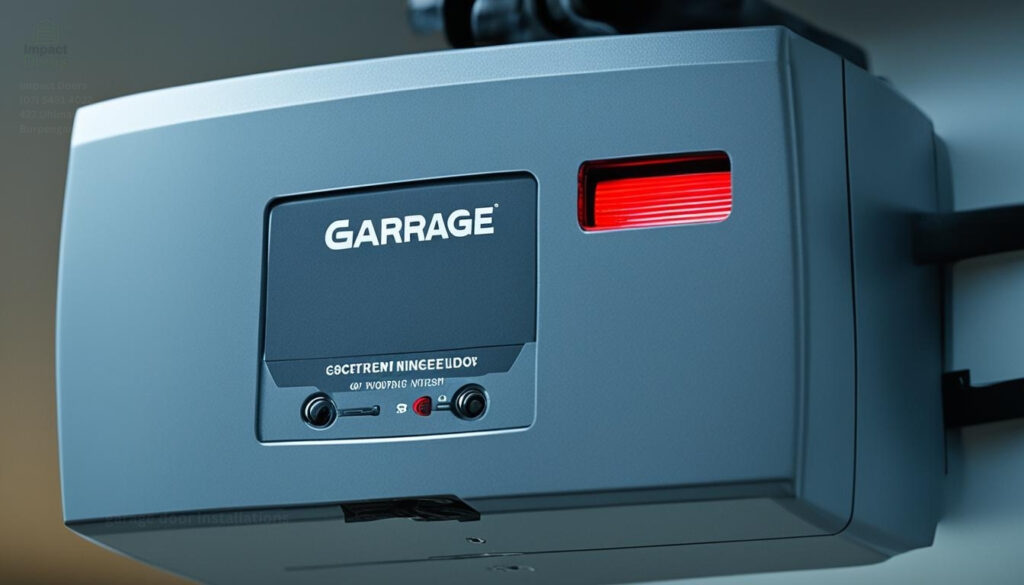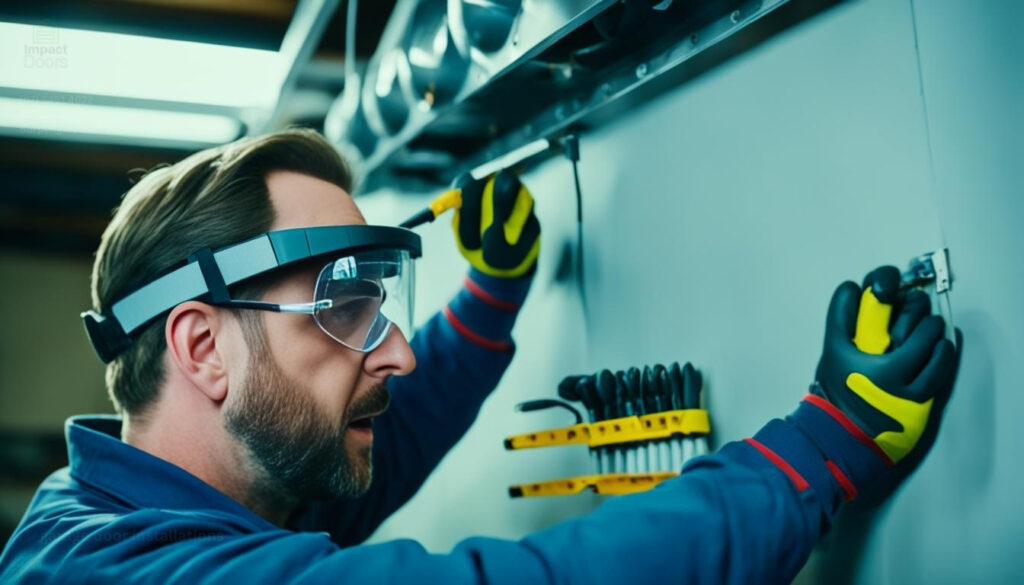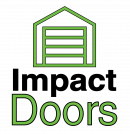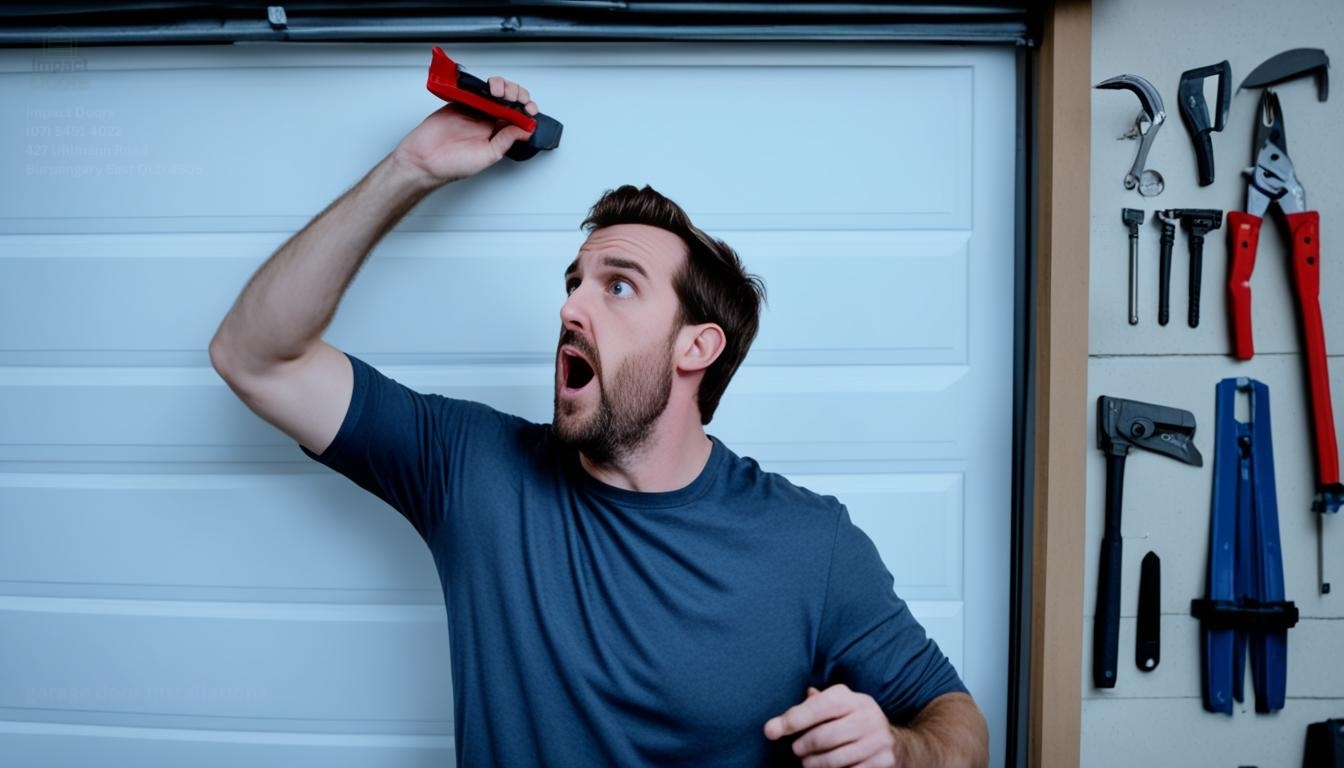Garage door troubles got you down? Don’t worry, you’re not the only one. From stubborn openers to weird noises, these issues are common household headaches.
Garage doors weigh about 150 kilos and open over 1,500 times yearly. It’s normal for them to act up sometimes. Many problems can be fixed without calling a pro.
Fixing issues early can save money and keep your door working well. DIY fixes are often possible for common troubles.
We’ll cover common garage door installation issues, alignment tricks, and opener problems. Learn how to fix doors that won’t move, faulty sensors, and broken springs.
Our guide will help you get your garage door back on track. You’ll be a pro at solving these pesky problems in no time.
Key Takeaways
- Early troubleshooting preserves garage door longevity and performance
- Many common garage door problems can be fixed by DIY enthusiasts
- Regular maintenance prevents costly repairs down the track
- Safety should be a top priority when dealing with garage door issues
- Professional help is recommended for major repairs like spring replacements
Understanding Common Garage Door Problems
Garage doors keep homes safe and easy to access. Several issues often trouble homeowners. Let’s look at these problems and what causes them.
Opening and Closing Issues
Balance problems can make doors hard to open or close. A good door stays put when lifted halfway. If not, the springs might need fixing.
- Off-balance doors
- Faulty openers
- Worn-out rollers
Regular upkeep can stop these issues. Oiling moving parts and checking for wear helps avoid costly fixes.
Sensor Blockages and Misalignments
Safety sensors stop accidents. If your door reverses or won’t close, the sensors might need adjusting.
Look for things blocking the sensors near the door’s bottom. Clean the sensor lenses and check they line up right.
Unusual Noises and Vibrations
Odd sounds from your garage door can mean trouble:
| Sound | Possible Cause |
|---|---|
| Slapping | Loose chains |
| Grinding | Worn rollers |
| Squeaking | Lack of lubrication |
| Vibrating | Loose nuts and bolts |
| Popping | Broken springs |
Fix these noises quickly to avoid more damage. Let pros handle spring repairs. They’re risky due to high tension.
“Regular maintenance tasks such as lubricating moving parts and inspecting for wear or damage are recommended to prevent common garage door problems and avoid costly repairs.”
Knowing these issues helps you care for your garage door better. Regular checks and quick fixes make your door last longer.
For more information on troubleshooting common issues during garage door installation, visit our page on garage door repair in Narangba.
Troubleshooting common issues during garage door installation

Installing a garage door can be tricky. Here’s a list of common problems and solutions. These tips will help you navigate the process smoothly.
Unresponsive remote controls often plague new garage door installations. First, check the batteries. If that doesn’t work, try reprogramming the remote.
For garage door remote control troubleshooting, follow these steps:
- Replace batteries
- Clear obstructions near the antenna
- Reprogram the remote
- Check for interference from nearby devices
Unusual noises during operation can indicate several issues. Lack of lubrication, worn-out parts, or misalignment are common culprits. Regular garage door track maintenance can prevent many problems.
Quality doors ensure prompt and safe service from garage doors. Most common issues are related to alignment problems.
If your door doesn’t fully open or close, you might need to adjust the limit settings. This process varies by model, so consult your manual.
For doors that reverse after closing, inspect and clean the safety sensors. Garage door panel replacement might be necessary if you notice damage or warping.
This is a job best left to professionals. It requires specialised tools and knowledge.
| Issue | Possible Cause | Solution |
|---|---|---|
| Unresponsive remote | Dead batteries | Replace batteries |
| Unusual noises | Lack of lubrication | Lubricate moving parts |
| Incomplete opening/closing | Incorrect limit settings | Adjust limit settings |
| Door reverses after closing | Dirty safety sensors | Clean and align sensors |
Regular maintenance is crucial for smooth functioning. Service your garage door system at least twice a year. This prevents issues and extends its lifespan.
Essential Tools and Safety Precautions

Fixing garage door issues needs the right tools and safety know-how. Let’s look at what you need for DIY repairs. We’ll also discuss when to call the experts.
Must-Have Tools for DIY Repairs
A good toolbox is key for fixing common garage door problems. Here’s what you need:
- Power drill
- Measuring tape
- Wrench set
- Level
- Screwdrivers (flathead and Phillips)
- Pliers
- Lubricant
These tools help with tasks like tightening bolts and oiling moving parts. They’re also useful for fixing door balance issues.
Safety Guidelines for Garage Door Maintenance
Safety comes first when working on garage doors. Follow these rules:
- Disconnect the power source before working on the opener
- Wear protective gear (gloves, safety glasses)
- Never attempt to adjust or remove the springs
- Keep children and pets away from the work area
- Follow manufacturer guidelines strictly
When to Call a Professional
DIY repairs can save money, but some jobs need expert help. Call a pro if:
- The problem persists after troubleshooting
- There are visible signs of significant damage or wear
- Repairs involve complex electrical or mechanical components
- You’re dealing with torsion spring issues
Garage doors are under high tension and can cause injury. If you’re unsure, it’s best to call a professional technician.
| Task | DIY or Professional? | Reason |
|---|---|---|
| Lubricating hinges | DIY | Simple, low-risk task |
| Adjusting opener travel limits | DIY | Can be done safely with proper knowledge |
| Replacing torsion springs | Professional | High tension, risk of injury |
| Major track repairs | Professional | Requires precise alignment and expertise |
Know your limits when fixing garage doors. This helps you maintain your door safely and effectively. You can handle many issues yourself, but some need expert help.
Maintenance Tips for Longevity
Regular upkeep keeps your garage door in top shape. Here are key tips to extend your door’s life and its parts.
- Clean the opener regularly to prevent dust and debris build-up
- Lubricate moving parts every three months to reduce noise and friction
- Check and replace damaged gear drive parts promptly
- Test the automatic reversing system for safety
- Inspect springs, cables, and rollers regularly
Proper garage door springs repair is vital for smooth operation. Lubricate all parts every six months. Do this more often in harsh weather or with heavy use.
Garage door sensor adjustments are crucial for safety. Clean the sensors often and check their alignment. This prevents issues and ensures safe door operation.
For garage door remote control issues, first check the batteries. If problems continue, try reprogramming. Keep the remote clean and away from extreme heat or cold.
“Regular maintenance is the key to a long-lasting garage door. It’s much easier to prevent problems than to fix them later.”
Do visual checks twice a year for wear or damage. Focus on weatherstripping to keep a tight seal. This stops drafts, moisture, and pests.
Many tasks can be DIY, but some need experts. Don’t try to fix springs and cables yourself. They’re under high tension and can be dangerous.
Always call a pro for these jobs. Follow these tips to keep your door running smoothly. You’ll avoid costly repairs and ensure home safety.
Conclusion
Garage door maintenance and troubleshooting are vital for optimal performance. Common issues include remote control malfunctions and worn-out springs. Proper alignment ensures smooth operation, while addressing opener problems prevents serious complications.
Regular upkeep prevents many issues. Clean guide tracks, lubricate hinges, and check sensors to extend your door’s lifespan. For complex problems like broken springs, call the experts.
Annual servicing keeps garage doors in top shape. Safety is paramount when handling these heavy, high-tension systems. Professional help is essential for certain repairs.
Stay alert and tackle problems early. This approach ensures your garage door remains reliable and secure. With proper care, it will serve you well for years.
FAQ
What are some common opening and closing issues with garage doors?
Off-balance doors, fuse problems, or opener malfunctions can cause opening and closing issues. Poorly balanced doors may struggle to move smoothly.
Why won’t my garage door reverse after closing?
Blocked or misaligned safety sensors can prevent your garage door from reversing after closing. Check the sensors near the door’s bottom to ensure they work properly.
What causes unusual noises and vibrations in my garage door?
Various issues can cause strange noises and vibrations. Loose chains may slap, while loose rollers can grind or squeak.
Loose nuts and bolts might vibrate, and rust can cause clinking sounds. Broken springs often make popping noises, while alignment problems can lead to banging or straining.
What are some common installation issues with garage doors?
Common problems include unresponsive remotes, weird noises, and incomplete opening or closing. The door may also reverse after closing.
Check remote batteries, clear obstructions, and reprogram if needed. Also, inspect the safety sensors for proper function.
What tools are essential for DIY garage door repairs?
Screwdrivers, pliers, an adjustable wrench, and lubricant are crucial for DIY repairs. Always unplug the opener before working on it.
Follow the manufacturer’s guidelines and safety precautions when doing repairs.
When should I call a professional for garage door issues?
Call an expert if problems persist after troubleshooting or if there’s significant damage. Seek help for complex electrical or mechanical repairs.
Garage doors are under high tension and can be dangerous if not handled correctly.
How can I maintain my garage door for longevity?
Regular maintenance is crucial for a long-lasting garage door. Keep components clean, tighten loose hardware, and test safety features often.
Check cables, springs, and lubricate moving parts. Inspect and clean sensors regularly. Test the door’s balance by disconnecting the opener.
A balanced door should stay in place when half-open.
Garage Door Installation Near You
When it comes to troubleshooting garage door installation, the team at Impact Doors has the expertise you need. Reach out to us at (07) 5451 4022 to schedule your installation service and improve your home’s curb appeal.

